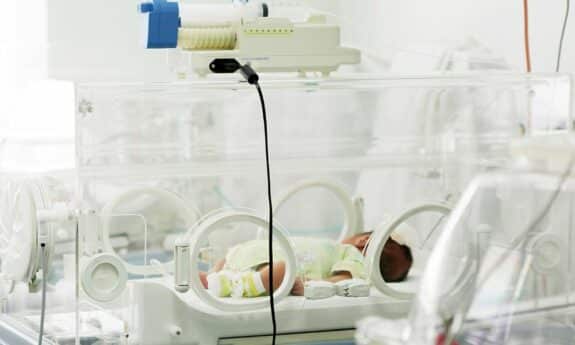The United States is still facing a high rate of premature births, particularly in the southern region, according to the respected nonprofit organization March of Dimes. Their latest annual report, released on Thursday, reveals that the preterm birth rate in the country was 10.4% in 2022, decreasing only by 1% from the previous year, which saw the highest rate in over a decade.
Dr. Elizabeth Cherot, the President and CEO of March of Dimes, expressed concern over the minimal change, stating that a slight decrease is not substantial enough. The organization awarded the United States a D+ grade for its preterm birth rate, which is the leading cause of infant deaths in the nation. This marks the second consecutive year that the country has received such a grade.
Historical data from the National Center for Health Statistics shows that the national preterm birth rate rose steadily for more than two decades, peaking at 12.8% in 2006. However, the rate fell to 9.8% in 2012 before rising to 10.4% last year.
Various factors contribute to a mother’s risk of delivering prematurely, including smoking, high blood pressure, unhealthy weight, diabetes, previous preterm births, and carrying multiple babies. Dr. Cherot emphasized that the country is failing in prioritizing the health of mothers and babies, emphasizing the need for action and improvement.
The report also assessed the preterm birth rates in the 100 US cities with the highest number of live births in the previous year. Approximately one-third of these cities received failing grades. The cities with the highest rates of preterm birth included Birmingham, Alabama (14.8%), Detroit (14.5%), Cleveland (14.1%), New Orleans (13.5%), and Memphis (13.3%). On the other hand, Ramapo, New York (5.3%), Irvine, California (7.1%), Seattle (8.1%), San Diego (8.6%), and Long Beach, California (8.8%) had the lowest rates of preterm birth.
At the state level, Alabama, Arkansas, Georgia, Kentucky, Louisiana, Mississippi, South Carolina, and West Virginia received F grades for preterm birth rates. No states obtained an A grade.
The report also highlighted the disparity in preterm birth rates among different racial and ethnic groups. Infants born to Black mothers were more likely to be born prematurely, with a rate 1.5 times higher than that of other babies. The rates were 14.6% for Black babies, 12.2% for American Indian, Alaska Native, and Pacific Islander babies, 10.1% for Hispanic babies, 9.4% for White babies, and 9% for Asian babies. Dr. Cherot urged a focus on addressing these higher rates among certain communities.
Furthermore, the report revealed that Black infants were at the highest risk of mortality before their first birthday. Although the overall infant mortality rate in the US decreased by 10% in the past decade, babies born to Black mothers still experienced a rate 1.9 times higher than the national average and twice as high as that of White babies.
In 2021, a total of 19,868 babies nationwide died before reaching one year old, with the highest rates of infant deaths observed in the South and Midwest regions. Similar regional patterns were observed in maternal health outcomes.
The report also uncovered a disheartening trend of increasing maternal deaths in the United States since 2018. The rate of deaths resulting from pregnancy or childbirth complications rose from 17.4 deaths per 100,000 individuals in 2018 to 32.9 deaths per 100,000 individuals in 2021.
Dr. Georges Benjamin, the Executive Director of the American Public Health Association, expressed his concern over the findings, stating that there are still significant challenges that need to be addressed. He emphasized the importance of providing adequate prenatal care for women with high-risk pregnancies and ensuring that they receive comprehensive care within well-designed systems.
The March of Dimes report highlights the ongoing issue of high rates of premature births in the United States, particularly in the southern region. It calls for urgent action to improve maternal and infant health outcomes, address disparities among different racial and ethnic groups, and enhance access to quality prenatal care.
More Infant Health News:
- Recalled Applesauce Linked to High Blood Lead Levels in 22 Children
- FDA Issues Warning About Probiotics for Preterm Infants
- Mandatory Newborn Screening for Duchenne Muscular Dystrophy in New York State Starting in 2024
- University of Bristol Study Reveals Alarming Link Between Neonatal Illness and Child Mortality







